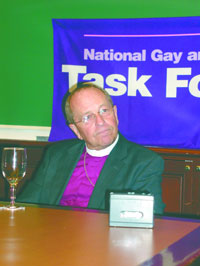Gay Episcopal leader strikes magnanimous note following his contentious elevation
On March 24, the nation’s Episcopal bishops reached a compromise that has roiled the church in America since Robinson’s elevation, allow dissenting parishes to host ministers opposed to the church’s mostly affirmative policies on gays and lesbians. During a three-day convention in Texas, a majority of the 160 bishops, including some of the church’s more conservative leaders, agreed to the plan in an attempt to head off the threatened schism.
According to the Washington Post, one conservative theologian in the diocese of South Carolina, Rev. Kendall Harmon, said, “I wish for the best, but I don’t see how it can succeed. The whole preoccupation of the document seems to be the authority and rights of the bishops involved rather than the needs of those who feel oppressed, so the whole thing is inverted.”
Kendall was referring to the public opposition mounted by dissenting parishioners nationwide, including some within Robinson’s own diocese, who have stated their unwillingness to obey the leadership of a gay man.
Last summer, at a contentious convention, delegates to the 2.3 million-member church’s quadrennial gathering voted to approve Robinson’s elevation, as well as an optional blessing ceremony for same-sex couples seeking religious recognition. The blessing ceremony is not equivalent to the full liturgy performed at marriages, but nonetheless, traditionalist Episcopalians objected and began organizing a national network of parishes dedicated to a more orthodox adherence to church principles.
Robinson has been in a 15-year relationship with his partner, Mark Andrew.
At an awards ceremony held by the National Gay and Lesbian Task Force in New York on March 15, Robinson spoke to the press about his recent elevation, as well as his plans for leading his diocese. Andrew attended the press conference and while he declined questions afterwards, Robinson made several references to him during his remarks. Robinson also spoke of his former marriage and of his two grown daughters, Jamee and Ella.
Robison acknowledged that the procedural vote last summer to grant “consent” to the bishropric to formally consider his elevation was “such a very hot topic.” Robinson said that “there are a number of people who voted against my consent at the General Convention whom I consider to be very good friends, and who, for one reason or another, probably thought this was the wrong time, it was too soon, it would cause too much disruption. They voted no on my consent, but that doesn’t mean they can’t be friends and it certainly doesn’t mean they can’t be brothers and sisters in Christ.”
Robinson struck an optimistic, cheerful note throughout his remarks, demonstrating an ease with both scriptural references to sexuality and a religious piety not characteristic of a discussion that includes a substantial focus on gay and lesbian rights.
As for the historic role Robinson will now play not only in the administration of his diocese, but within the larger context of leadership during an era of enormous social changes for the gay and lesbian community, Robinson said that his acceptance of his own homosexuality contributes to his ability as an administrator.
“Well, I think there is something about being part of any oppressed group, that teaches you sensitivity to other folks. I think, most simply, it makes you a good listener, and I think any good administrator, any good leader, is not one who pontificates on each and every aspect of life, but in fact learns from the people around them. So, my leadership style is one very much of collaboration rather than hierarchy,” said Robinson, sounding both contemplative and determined to succeed, both administratively and ecclesiastically.
Robinson expounded on how he views the use of authority in an institution such as his church.
“I think there are so many connections between the ‘isms’—racism, sexism and heterosexism and ableism—all those ‘isms’ have so much in common in terms of the connections we understand about power and how power works and what kind of an effect those in power can have on those over whom power is exercised,” said Robinson. “I think it must be hard for straight white males who may never have experienced that, to understand what it feels like to be on the other side of it.”
As for biblical proscriptions against homosexuality, Robinson said there are only seven passages in the Bible that can be construed as referring to gay sexual conduct or same-sex relationships, none of which, according to Robinson, embrace a modern notion of homosexuality and are therefore historically inaccurate depictions of how to approach challenges such as same-sex marriage equality.
Robinson acknowledged that he has received death threats, but would not elaborate on what security measures are in place to safeguard his life.
“It is a constant reality in my life,” he said, “but I made a decision early on that I was not going to let my life get run by that—or ruined by that.”
Robinson also spoke candidly about how such threats have forced him to contemplate his mortality, considering the frequency with which he appears at large public venues.
“The reason I can do it is that it relates to my faith,” Robinson said, adding, “so, I understand beyond any shadow of a doubt that I am going to heaven. I just have no doubt about that.”
Robinson said he would “hate not seeing [his] grandchild grow up” and that he remains vigilant about what is happening around him. “But I happen to believe in a God that is victorious over death and I just don’t have to obsess about it,” said Robinson.


































